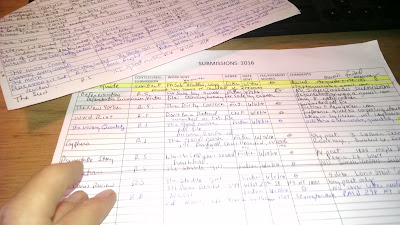Who knew better than she about challenges? In comparison, certainly not me. (I?) Like I keep saying, creative writing major, not an English major.
Comparing the entering of fiction/poetry/essay contests to the life of Helen Keller I'll admit, is cheeky. But, there all similarities. I am blind about these contest things, suspicious of their authenticity, fearful of hidden agendas and mostly concerned that I will be force fed a plate of cold eggs. As there are thousands of journals to consider for submission of your work, there are also just as many contests which promise big bucks, instant fame, dream workshop and/or reading events, year long all-expense-paid residencies or at least, free copies of the journal that printed your entry.
How does an emerging writer sort through them? Which are valid and which are just a ruse for magazine subscription? Do I waste my time, their time, the worlds time or do I put all my money allocated into contest submission towards the lottery instead?
My primary source of contest availability is in each issue of Poets & Writers. They do all the hard work of vetting each contest and dedicate a portion of each issue to these competitions.When my issue arrives I pull out my black permanent marker, for drama, and mark off those that do not apply to me. Some limit entries to specific ages, geographical locations and specific themes. Some apply only to poetry collections or first novels. After a 30 minute read I've narrowed down my choices.
Entry fees vary. Usually the larger the prize the higher the entry fee, but not always. Most range between $10-$20 per submission. Some take Paypal, some credit cards and oddly enough, some will even take cash. Talk about a gamble! Most take online submissions but a few still want only hard copy. Some will notify you if you lose and others you will never ever hear from, unless of course you win. Because my first published poem was submitted to the IYEATS Poetry Contest, I also spend time checking out the contests overseas. If you are specifically interested in the contests offered in Ireland, England, Wales etc...you must check out the blog of Emerging Writer. She does so much of the footwork for all of us other emerging writers and I am so grateful to her-whoever she is-for that!
One last piece of advice I'll leave with you is a helpful article I found titled How Not To Win a Poetry Contest. It was penned by Miriam Sagen who has read thousands of contest entries and won a few contests herself, over the years. Written as a guest post in 2011 for The Writers Digest Website, her article stresses the basics like FOLLOW DIRECTIONS when you are submitting, and READ THE WORK OF OTHER POETS, lots of them. Her advice is seriously lighthearted and so worth the few minutes it takes to read.
Now, enter some contests. Let us all know how you do and as my Italian teacher would say before each exam, "In bocca al lupo!" which means literally, in the mouth of the wolf, and figuratively, Good Luck!
JULY 7, 2016 UPDATE
In May and June I entered fourteen contests and submitted seventeen regular submissions. I did not just send the same story out to all of them, but hand selected old stories and revised them or submitted new stories all together. Of those thirty one total submissions, I have recieved four rejections.Most state it takes two-three months before they will respond and about one forth of them said they don't respond at all if they cannot use your material.
JULY 7, 2016 UPDATE
In May and June I entered fourteen contests and submitted seventeen regular submissions. I did not just send the same story out to all of them, but hand selected old stories and revised them or submitted new stories all together. Of those thirty one total submissions, I have recieved four rejections.Most state it takes two-three months before they will respond and about one forth of them said they don't respond at all if they cannot use your material.





